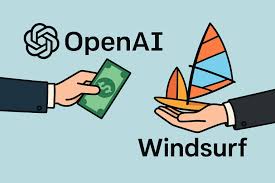In a significant move within the artificial intelligence (AI) sector, OpenAI has agreed to acquire Windsurf, an AI-assisted coding tool formerly known as Codeium, for approximately $3 billion. This acquisition represents OpenAI's largest to date and underscores its commitment to enhancing AI-driven software development tools. The deal is poised to reshape the landscape of AI coding assistants and intensify competition among leading tech firms.
Background of Windsurf
Windsurf emerged as a prominent player in the AI coding arena, offering developers a platform that integrates seamlessly with various Integrated Development Environments (IDEs) such as VS Code, JetBrains, and Jupyter. Its features include context-aware code suggestions, intelligent code generation, and debugging capabilities, all powered by advanced AI algorithms. The tool's emphasis on enterprise-grade data privacy and deployment flexibility has made it a preferred choice for organizations seeking robust AI coding solutions.
Strategic Implications of the Acquisition
The acquisition of Windsurf by OpenAI is a strategic maneuver aimed at bolstering its position in the AI-assisted coding market. By integrating Windsurf's capabilities, OpenAI seeks to enhance the coding functionalities of its flagship product, ChatGPT. This move also positions OpenAI to directly compete with other AI coding tools like GitHub Copilot, offering developers a more comprehensive suite of AI-driven development resources.
Market Dynamics and Competitive Landscape
The AI coding assistant market is witnessing rapid growth, with major players like Microsoft and Google investing heavily in their respective tools. OpenAI's acquisition of Windsurf signifies its intent to capture a significant share of this burgeoning market. The integration of Windsurf's technology is expected to provide developers with enhanced code generation capabilities, improved debugging tools, and a more intuitive coding experience.
Future Prospects and Industry Impact
The OpenAI Windsurf acquisition is anticipated to have far-reaching implications for the AI development community. Developers can expect more advanced coding assistants that streamline the development process, reduce errors, and accelerate project timelines. Furthermore, this acquisition may prompt other tech giants to pursue similar strategies, leading to increased consolidation and innovation in the AI coding tools sector.
Conclusion
OpenAI's strategic acquisition of Windsurf marks a pivotal moment in the evolution of AI-assisted coding. By combining their strengths, the two companies are set to redefine the standards of AI-driven software development, offering developers unprecedented tools and capabilities. As the industry continues to evolve, such collaborations will play a crucial role in shaping the future of coding and software engineering.
Read More






 Saturday, 28-02-26
Saturday, 28-02-26







